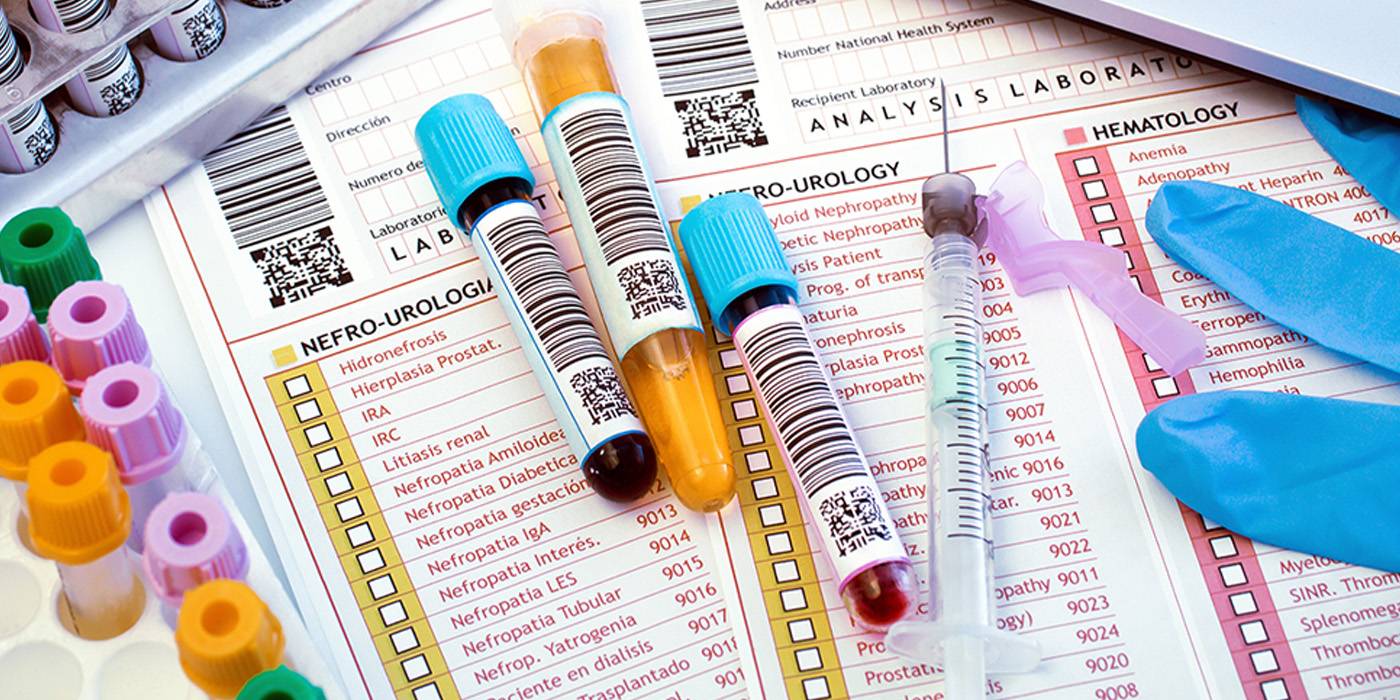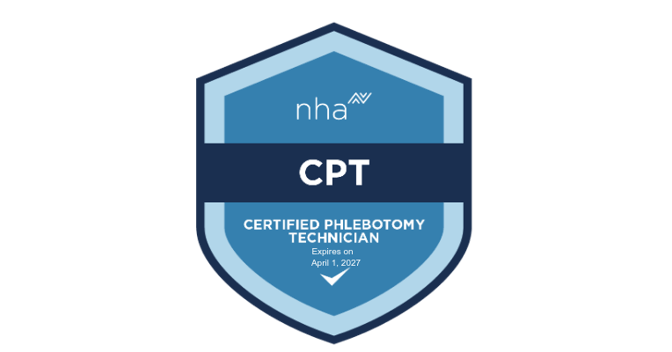Learn the role and responsibilities of a phlebotomy technician while preparing for the Certified Phlebotomy Technician (CPT) certification exam.
Phlebotomy Technician

Job Outlook
According to ZipRecruiter, the average phlebotomist technician salary is $42,055 as of November 2025. Salary can depend on your location, industry, experience, and other factors. For example, the lowest 10% earned less than $29,000 per year, while the highest 10% earned more than $59,000 annually. Phlebotomists are currently in demand. The Bureau of Labor Statistics estimates that employment for phlebotomists is projected to grow by 6% through 2034, which is faster than the average for all occupations. That translates to 18,400 job openings per year.
Become a Certified Phlebotomy Technician
This 100% online certified phlebotomy technician course will train you to work as a phlebotomy technician, as you will learn about drawing blood from patients and blood donors, evaluating patients' ability to withstand the procedure, and helping them feel comfortable. Adequately explain the blood-drawing procedure to patients and the importance of answering their queries.
This asynchronous, online phlebotomy training will also introduce you to performing basic point-of-care testing, such as reading blood glucose levels, preparing blood, urine, and other specimens for testing, and maintaining medical equipment such as needles, test tubes, and blood vials. The medical terminology training module introduces key concepts about medical language and human anatomy, emphasizing the interconnectedness of body systems in health and disease. For those with prior knowledge of medical terminology, you can optionally test out by achieving a minimum score of 80%, replacing course content if desired. This course feature only applies to the Medical Terminology portion.

The course includes a lab kit for assignments and aligned simulations for practice. You will have the opportunity to participate in a clinical experience (see full disclaimer under Prerequisites and Certification Requirements below).
Upon eligibility, a complimentary voucher to sit for the Certified Phlebotomy Technician certification exam through the National Healthcareer Association (NHA) is provided (review full details under Prerequisites and Certification Requirements below). You will need to successfully complete all assignments with a 70% before you can complete the midterm or final exam.

Note: This course does not meet state requirements for students intending to work in California. Ensure that the Certified Phlebotomy Technician course meets your state's requirements.
Course Objectives
- Learn the medical terminology needed to work in phlebotomy, including the structures and functions of the human body
- Gain a comprehensive overview of the roles and responsibilities of a phlebotomy technician
- Get comprehensive training to help you gain new vocation as a phlebotomy technician and be fully prepared for any clinical scenario
- Prepare to sit for the Certified Phlebotomy Technician (CPT) certification exam through the National Healthcareer Association (NHA)
Prerequisites and Requirements
To take this online course, you must be 18 years of age or older and have one of the following: High School Diploma, GED or equivalent, entrance test, or previous healthcare experience. To qualify for the certification exam, a High School Diploma or equivalent is required. Please check with your state for any specific requirements they might have before registering for the course.
Disclaimer: To qualify for the clinical experience application process, students must successfully complete the online course and ensure their account balances are current (at a minimum). It is important to note that ed2go cannot guarantee placement at any clinical site, and students must take full responsibility for fulfilling their clinical requirements. However, our affiliated partnerships can increase the likelihood of finding a site that matches student needs. Students can begin researching the steps of the application process two weeks before completing course. To sit for the NHA CPT certification exam, candidates must have a high school diploma or equivalent. It is recommended you have this before enrolling in this program. In addition, for NHA certification, you must successfully complete the required number of venipunctures and dermal punctures. Certification exams offered by NHA are only available online to candidates located in the US.
Instructors
Carline Dalgleish
Carline Dalgleish has worked in medical office administration for over 30 years. She holds a bachelor's degree in Business Information Systems, a master's degree in Leadership, and a post-baccalaureate certificate in Health Information Management. She is a Registered Health Information Administrator, and an AHIMA Approved ICD-10-CM/PCS Trainer. Dalgleish is the author of an ICD-10 coding system and owns her own consulting firm, AnnGrant Educational Services.
Sharon L. Blackford
Sharon L. Blackford, MA, BA, RMA, has over 30 years of experience in the medical field. She has a master's degree in Organizational Management, and a bachelor's degree in Business Management and has served as a Registered Medical Assistant since 1994. Sharon was an active-duty Clinical Specialist in the U.S. Army for 10 years. Sharon later moved to the Gulf Coast to accept a position as the Director of Education of Blue Cliff College and was promoted to Campus Director.
Stacey O'Brien
Stacey O'Brien has more than 10 years of experience in medical coding and reimbursement. Ms. O'Brien has been a risk adjustment coder for a Medicare advantage plan, audited medical records for a consulting firm, and currently supervises the coding and electronic claims submission process for a group medical practice. She has a bachelor's degree from the University of Pittsburgh and a CPC coding certification from the AAPC.
Dr. Barry Martin
Dr. Barry Martin has been working in the medical lab for the past 15 years as a certified medical laboratory scientist. Dr. Martin received his doctorate degree from Liberty University, his master's degree from NC A&T State University, and undergraduate degrees from Winston-Salem State University, UNCG, & Lenoir-Rhyne College. Dr. Martin has a vast amount of experience working in the lab and enjoys sharing his knowledge with others.
Dr. Georgia McCauley
Dr. Georgia McCauley has worked as a phlebotomy and medical laboratory science educator for 25 years and has a certified medical laboratory scientist for over 40 years. She earned a PhD and an MBA in Health Care Administration, and undergraduate degrees in business and medical technology.
Dr. Karen Hunter
Karen Hunter holds a PhD and Master of Science in Health Care Administration and undergraduate degrees in Biology and Medical Technology. She has been a certified Medical Technologist for more than 30 years and has over 20 years of experience in Medical Laboratory Science and Phlebotomy education. Highlights of her career include designing and implementing a Medical Laboratory Science program at the Polytechnic of Namibia, Africa and developing Phlebotomy workshops at several Community Colleges.
FAQ
Certified Phlebotomy Technician
-
What Does a Phlebotomy Technician Do?
Phlebotomy technicians are responsible for drawing blood needed for tests, donations, transfusions, and research, conducting patient interviews, checking patients' vital signs, and transporting blood samples to the laboratory for testing.
-
Where Do Certified Phlebotomy Technicians Work?
Whether you choose to work in a hospital, medical lab, blood donation center, or doctor’s office, phlebotomy technicians perform an essential function in our healthcare system by working directly with patients as well as doctors, nurses, and other healthcare professionals.
-
Why Is the Demand So High for Phlebotomy Technicians?
According to the BLS, blood analysis remains an essential function in medical laboratories and hospitals. Demand for phlebotomists will remain high as doctors and other healthcare professionals require bloodwork for analysis and diagnosis. In addition to blood analysis, phlebotomists are necessary for blood collection, either at mobile blood centers or dedicated donation centers. These phlebotomists may be especially busy during a health emergency, which can correspond with heightened interest in blood donations.
-
Curriculum
- Medical Terminology
- The Musculoskeletal System
- The Cardiovascular System
- The Lymphatic and Immune Systems
- The Respiratory System
- The Digestive System
- The Urinary System
- The Nervous System
- The Special Senses: The Eyes and Ears
- The Integumentary System
- The Endocrine System
- The Reproductive System
- Diagnostic Procedures, Nuclear Medicine, Pharmacology
- Certified Phlebotomy Technician
- Introduction to Phlebotomy
- Anatomy for Phlebotomy Technicians
- Personal and Patient Safety
- Infection Control
- Quality Control
- Foundations and Preparation for Blood Collection
- Performing the Blood Collection
- Post-Collection Procedures
- Dermal Puncture and Capillary Collection
- Post-Collection Procedures for Dermal Puncture and Capillary Collection
- Special Collections
- Special Considerations
- Non-Blood Collections and Less Commonly Performed Procedures
- Lab Procedures, Processing, and Operations
- Legal and Ethical Matters
- Medical Terminology
